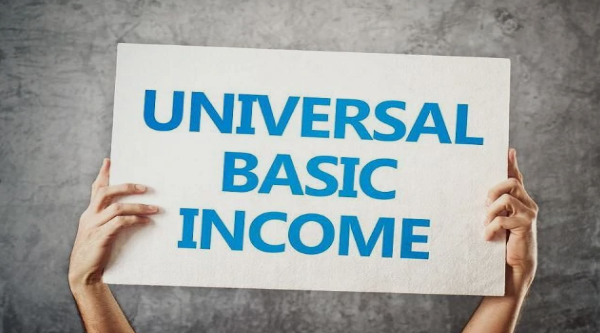Universal Basic Income in India (GS Paper 3, Economy)

Context and Introduction
- India's economic landscape is undergoing significant transformations, driven by rapid technological advancements and automation.
- These changes, while boosting productivity, have resulted in jobless growth—where economic output rises, but employment does not keep pace.
- This phenomenon, coupled with rising inequality and youth unemployment, has sparked discussions about implementing a Universal Basic Income (UBI) as a potential solution.
- Universal Basic Income (UBI) is a policy where the government provides all citizens with a regular, unconditional sum of money.
- This financial support is intended to ensure that everyone has a basic level of income, irrespective of their employment status or wealth.
Current Economic Challenges in India
- Jobless Growth: India is witnessing a paradox where economic growth does not translate into job creation. Automation and artificial intelligence (AI) are streamlining processes, reducing the need for traditional labor. This has exacerbated the problem of jobless growth, where the benefits of increased productivity are not reflected in employment figures.
- Youth Unemployment: A significant portion of the unemployed demographic in India comprises the youth. This situation underscores the need for innovative policies that address both unemployment and underemployment.
Existing Welfare Measures and Semi-UBI
- India already implements several cash transfer schemes aimed at specific groups, such as farmers, women, and the unemployed.
- While these programs provide targeted support, they do not constitute a universal basic income.
- These schemes, however, offer a foundational approach towards the concept of UBI by providing basic income support to vulnerable populations.
Arguments in Favor of UBI
- Stimulating Economic Demand: UBI could enhance consumer spending by providing individuals with a steady income. Increased demand could, in turn, drive economic growth and stability, particularly in times of economic downturns.
- Reducing Inequality: By offering financial support to all, UBI could help mitigate income disparities. It would provide a safety net to those who are adversely affected by automation and AI-driven job losses.
- Supporting Vulnerable Groups: A universal income would ensure that marginalized communities and individuals lacking stable employment receive financial security. This could be crucial in addressing poverty and improving living standards.
Challenges in Implementing UBI
- Financial Feasibility: The cost of implementing UBI in a country as vast and diverse as India would be substantial. The government would need to reallocate resources from other welfare programs, which could impact existing social safety nets.
- Potential Social Implications: There is concern that providing income without requiring work could lead to social alienation. Individuals might feel a loss of dignity and purpose if they receive financial aid without contributing economically.
- Addressing Income Distribution: While UBI could provide a basic level of financial support, it may not fully address issues of uneven income distribution. Without accompanying measures to create jobs and promote equitable growth, UBI alone might not be sufficient.
Focus on Employment Generation
- Investment in Labour-Intensive Sectors: Current government investments are heavily skewed towards capital-intensive sectors like infrastructure. Shifting focus towards education, healthcare, and rural development, which are more labor-intensive, could generate significant employment opportunities.
- Impact of Automation: The rise of automation necessitates policies aimed at creating jobs in industries that rely on human labor. Developing sectors that are less susceptible to automation could help balance the employment scales.
Addressing Skills Mismatch
- Education and Skill Development: There is a growing gap between the skills required by modern industries and those possessed by the workforce. Investing in education and vocational training can help bridge this gap, making the labor force more adaptable to technological changes.
Alternatives to UBI
- Enhanced Social Safety Nets: Instead of a universal income, India might focus on expanding and improving existing safety nets such as healthcare, education, and employment guarantee schemes. These can be universally applied and better funded to offer comprehensive support.
- Tax Reforms: Raising revenue through progressive taxation, particularly targeting higher-income groups, could provide the funds needed for enhanced social safety nets or a UBI-like program without straining the government’s budget.
Conclusion
- While the idea of Universal Basic Income is compelling and could potentially address several pressing issues in India, its full-scale implementation faces significant challenges.
- Financial feasibility, social implications, and the need for effective job creation are critical factors that must be addressed.
- In the short to medium term, strengthening existing social safety nets, investing in labor-intensive sectors, and tackling income inequality through targeted measures may offer more practical solutions.
- UBI could be considered as part of India’s future policy framework, but its introduction should be approached with careful planning and a clear understanding of the country’s economic and social context.


